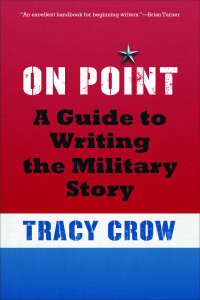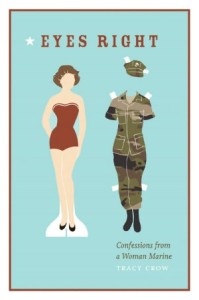From chapter 1 of On Point
Owning our story can be hard but not nearly as difficult as spending our lives running from it. —Dr. Brené Brown
When I left the Marines in 1987, after nearly ten years, I left with a story I never intended to tell.
That all changed. Eventually, I would share my story, even though it was rife with admissions of guilt and shame and regret and finally, after many years of consternation and denial, compassion for that younger version of myself. I have now told her story, and many other stories since, because when I was ten, I dreamed of becoming a writer.
What I couldn’t have known at ten is that a flip decision to join the Marines in an effort to escape a childhood home filled with domestic violence and to save myself from teenage alcoholism would become the vehicle for driving me toward a future writing life.
From Tracy’s introduction in Red, White, & True
In your hands, unless you are reading this online, are thirty-two profoundly true stories that collectively represent an accurate portrayal of the American military story from World War II to Iraq and Afghanistan. I know of nothing else like this: thirty-two writers — veterans, military spouses, and now grown children and grandchildren of veterans — all sharing how their lives have been affected by military service.
I should warn you that this is not a warmongering, flag-waving, mission-accomplished collection. Nor is it a flag-burning protest collection; in fact, far from it. I received those types of submissions, sure, and I am grateful for the trust those writers placed within me for reading such intimate information, but in the end I selected stories that went much deeper on an emotional level. In other words, the events of some stories may be more shocking, but without the depth of emotional truth, they read as too hollow, too anecdotal.
What I believe makes this collection unique are its truth-seeking searches that span generations of military service. As you will soon discover from a number of these stories, we are just beginning to understand and comprehend how children and grandchildren of veterans have been affected by military life — by military customs and traditions, the long absences, the tragic combat deaths, and a survivor’s guilt. And sadly, because of a death rate of more than six hundred veterans a day — we are losing stories from our World War II veterans — many of whom have yet to share their experiences….
From the opening of Tracy’s award-winning memoir, Eyes Right
When I was twenty-eight, younger than my daughter is today, I was facing the likelihood of a court-martial. I followed a Marine sergeant down a polished corridor, past the clacking of typewriters and murmurs behind the closed doors of Military Police Headquarters, and pretended to be unafraid, as if I had nothing to hide, as if on the way there that morning I hadn’t seriously mapped out a plan for desertion. Inhaling and exhaling in the same forced rhythm of a runner pacing through a psychological wall, I was committed to a marathon of sorts, and so I was breathing in and out, matching foot speed and cadence with the young Marine ahead of me: a machinated force, we were, matching left foot and right, left arm and right, until he pulled up short in front of a closed door. My toe stubbed against the heel of his boot. Acting politely unaware, he pushed open the door and stepped aside for me to enter. he wore well his role of consummate Marine, refusing the eye contact I was desperate to interpret.
“The captain will be with you shortly, Ma’am,” he said.
“I forced a smile. “Thank you, Sergeant.” After he disappeared behind the closed door, I heard those machine-like limbs working their way back down the corridor.
This was March 1987. The year Prozac made its debut. Gasoline was eighty-nine cents a gallon; the cost to mail a letter, just twenty-four cents. Televangelist Jim Bakker had self-destructed, much the same way I had.
From chapter 1 of Tracy’s Carver Greene novel, An Unlawful Order
Chase had logged two miles, barely time to break a sweat, when Sergeant North showed up, slowing the military sedan to a crawl in the middle of the road. Chase ran in place, giving North time to lower the window. Behind his aviator sunglasses and the tease of a new mustache, North looked more like a police officer pulling over a hitchhiker. “Sorry, Captain,” he shouted above the whirring of a helicopter now overhead on approach of the flight line. “We’ve got a crash.”
Chase jumped inside the sedan and reached over a shoulder for the seatbelt as North made a wide u-turn for the office. “What’s down?”
“Another 81, Ma’am.”
“Damn it,” she said, and slapped the dash. The day she had learned of Stone’s helicopter crash in Afghanistan, she was running within the perimeter of a desert tent city on the outskirts of Baghdad, daydreaming about him and their daughter, Molly, when the colonel who was head of Public Affairs flagged her down. The combination of the news and heat had nearly caused her to vomit on the colonel’s boots. Instead, she’d climbed into the colonel’s Humvee and focused on the horizon the way she’d learned to do to combat seasickness aboard a ship.
“The media?”
“MP’s at the gate are holding two crews already,” North said. Thanks to the media and their police scanners, bad news traveled fast. Harry Truman once said the Marines had a propaganda machine nearly as good as Stalin’s. As a public affairs officer, Chase was never more aware of her role in disseminating that propaganda than in the moments following a helicopter crash. At twenty-nine, her job for seven years had been to tell the Marine Corps story in ways that were sure to increase recruitment and retention. Therefore, all accidents happened during routine training exercises; all accidents were under military investigation; all names were withheld pending notification of next of kin; and all other information was deemed “inappropriate for comment,” the Defense Department’s kinder, gentler approach to No comment.
